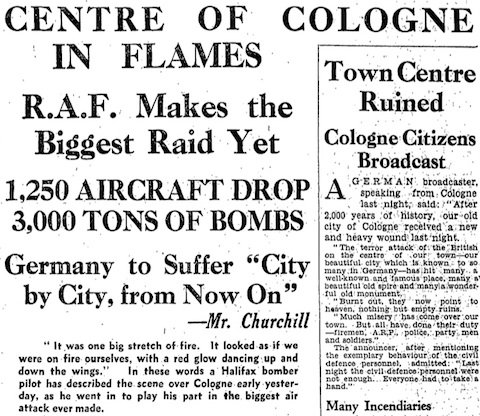Shortly after the Blitz began in earnest, Conservative MP Victor Cazalet wrote to the editor of The Times to urge that the RAF carry out reprisals against German cities for the ‘indiscriminate bombing’ of London.1 ‘The attack on the civil population is a military weapon’, he argued. ‘Can we possibly afford to give Germany a monopoly of this weapon?’
Cazalet’s letter ignited (or, rather, re-ignited) a debate about the efficacy and morality of reprisals. Less contoversial, however, was the way he thought reprisals should be carried out:
We should, I suggest, designate some 12 German towns, and openly declare that unless this indiscriminate bombing ceases we intend to wipe out each night one of these German cities. Let each one of the towns selected anticipate when their turn may be coming. If they evacuate them all — we will choose 12 others.
Cazalet was convinced that this would have ‘a most striking and speedy effect upon the German population […] Widespread bombing will quickly disillusion them’, given their reliance on propaganda for knowledge of how the war was progressing.
In the following weeks a number of letters published in The Times made a similar suggestion of reprisals after notice — half a dozen by my count (including another one by Cazalet clarifying his position); Another five appeared in the Manchester Guardian from the end of September. The Daily Mirror columnist Cassandra had already demanded in August that the RAF ‘BOMB THESE TEN TOWNS’! after giving a warning along the following lines:
THE POLICY OF HIS MAJESTY’S GOVERNMENT WAS, AND IS, TO AVOID RETALIATION AND MASS REPRISALS AGAINST CIVILIANS. IF, HOWEVER, THE GERMAN GOVERNMENT CONTINUES TO BOMB BRITISH CIVILIANS, THE FOLLOWING TOWNS WILL BE SUBJECT TO INTENSE AERIAL BOMBARDMENT AFTER TEN DAYS’ NOTICE FROM THE RECEIPT OF THIS COMMUNICATION:– HANOVER, BERLIN, MUNSTER, LEIPZIG, DRESDEN, WIESBADEN, FRANKFURT, NUREMBERG, MUNICH, SALZBURG. THIS WARNING IS TO GIVE THE GERMAN GOVERMENT AMPLE TIME TO EVACUATE ALL NON-MILITARY PERSONNEL FROM THESE CITIES. THEIR HOUSES AND THEIR PROPERTY WILL, HOWEVER, BE SYSTEMATICALLY DESTROYED.2
In December, the bishop of devastated Coventry thought that Britain ‘might well be morally justified’ in deciding to institute reprisals for indiscriminate bombing, though he hoped it would not come to that; ‘In any event he assumed that the Government would give warning of their intention to retaliate unless this kind of attack was stopped.’3
I think there are a few things going on here. One is the common overestimation of the abilities of Bomber Command at this time. This didn’t just extend to a belief in the accuracy of its bombing, but also in its ability to actually destroy cities. For example, J. Price Williams thought that ‘a notice that one of the populous modern industrial towns would (after a day or two for evacuation) be razed to the ground would probably act as a deterrent’.4 Needless to say, Bomber Command could not do this at will; by 1944-5 it was just about able to, but in 1940 it just did not have the numbers, the equipment, the training, the doctrine or the experience. This was a hangover from the pre-war knock-out blow theory.
More significantly, the idea of reprisals after notice was an attempt to find a moral way of fighting modern war. A widespread view was that Britain was fighting a just war using just methods, whereas Germany was not. But what if German methods were effective? What if fighting dirty gave Hitler an advantage over the British and their notions of fair play? Deliberately killing innocents, everyone agreed (or asserted that everyone agreed), was not something the British would ever do, but there were other ways of giving the Germans a taste of their own medicine and undermining their morale. By destroying the enemies’ cities but not their lives, Britain could simultaneously keep the moral high ground, placate neutral opinion and bring the end of the war closer.
Now, this idea of bombing after notice was never part of Bomber Command’s doctrine. But it had been used by other parts of the RAF, those engaged before the war in the air control of places like Iraq and Waziristan. As Cazalet himself put it in a second letter to The Times:
I never advocated indiscriminate bombing of women and children. I advocate the same policy as various British Governments have in the past applied to troublesome tribes in outlying parts of the Empire. Notice is given that unless certain conditions are fulfilled by a specified date a particular village will be bombed. The inhabitants evacuate them, but their homes are destroyed.5
Nor was Cazalet the only one to draw the comparison. Captain C. W. R. Hooper of the Royal Indian Navy (though writing from Cheltenham) wrote that since ‘[we] don’t want to retaliate by killing German women and children’,
I suggest we should adopt the system used on the N.W. Frontier of India — namely, warn the German Government of our intention to bomb Berlin as long as they continue to bomb London, giving them 48 hours’ notice to evacuate their women and children and saying that after that period of time, at our selected time, we shall bomb Berlin.6
If any German women or children ‘suffer’ in the bombing, Hooper went on to say, then it would be the Germans’ own fault for not evacuating them in time. That seems to me to be a bit of wilful ignorance on Hooper’s part (and he wasn’t the only one): he would surely have known from London’s own experience in 1938, 1939 and 1940 that a city couldn’t be evacuated in such a short time. But then again, perhaps the aim wasn’t wholly humanitarian. If the intention was to cause civilian suffering (and perhaps a knock-out blow), then a panicked exodus from a doomed city would do nicely.
Is it going too far to suggest that this application of imperial policing methods to total war implies an intellectual equivalence between the two? Since the British saw themselves as superior both to the barbarians over in Germany and out in the Empire, perhaps the same methods which had cheaply and effectively subdued the one could be used to subdue the other. And Britain, being the civilised party in these disputes, had to assume (or at least be seen to assume) a benevolent posture even as it was dealing out punishment. I don’t think much of Sven Lindqvist’s argument (in A History of Bombing) that bombing was ‘about’ imperialism, but in this particular instance it looks like one variant of it was imported from the periphery to the metropole.
Except, of course, that it was all just talk; reprisals after notice never actually took place. But the interest in it during the early Blitz suggests to me that it could have been revived later to publicly justify Bomber Command’s area bombing policy. Conversely, it could have been championed by opponents of bombing as a compromise way to humanise the air war. Probably in neither case were reprisals after notice even contemplated by the absolutists on either side.
![]() This work is licensed under a Creative Commons Attribution-NonCommercial-NoDerivatives 4.0 International License.
Permissions beyond the scope of this license may be available at http://airminded.org/copyright/.
This work is licensed under a Creative Commons Attribution-NonCommercial-NoDerivatives 4.0 International License.
Permissions beyond the scope of this license may be available at http://airminded.org/copyright/.






Pingback: Airminded · Bomb Berlin and…
Pingback: Airminded · Vox pops — III
Pingback: Airminded · Putting it together
Pingback: Cause and effect in British air policy discourse
Pingback: No escape | Airminded